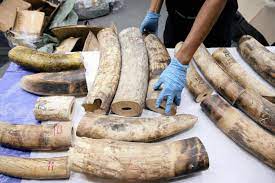By Phephile Motau
Eswatini has once again made a proposal to be allowed to trade its rhino horns, which could bring in about E170 million from the country’s 330kg stockpile. The country could make a further E10.2 million per year from harvesting rhino horns. The proposal has been made to the Convention on International Trade in Endangered Species of Wild Fauna and Flora (CITES) and will form part of the discussions during the 19th meeting of the Conference of the Parties CoP19 which will be held in Panama City, Panama from November 14 to 25, 2022.

The proposal is for the removal of the existing annotation on the Appendix II listing of Eswatini’s southern white rhino population, adopted at the 13th Conference of Parties in 2004, to enable the Kingdom to realise full Appendix II status for its white rhinos as provided for in Article IV of the Treaty, thereby permitting the regulated legal trade in Eswatini’s white rhinos, their products including horn and derivatives.
According to CITES Eswatini, the proposal is for the country to sell from existing stock 330 kg of rhino horn to licenced retailers in the Far East and also up to 20 kg per annum, including harvested horn, to those retailers.
Rhino products have been in demand for centuries in the Far East especially horn as a carving material and for use by Traditional Chinese Medicine (TCM) practitioners.
The proceeds from the sale of stocks should raise approximately E170 million (US$9.9 million) if sold at a wholesale price of about E510 000 (US$30,000 per kg). The organisation said the amount would be placed in a conservation endowment fund to yield approximately E10.2 million (US$600,000) per annum. In addition, the proceeds of the annual sale of up to 20 kg of the horn will raise a further E10.2 million (US$600,000) per annum, bringing total recurrent annual income from horn harvesting to E20.4 million (US$1.2 million).
The local CITES Management Authority, which is the Big Game Parks argued that rhino horns regrew after cropping and the annual sales of 20 kg could be sourced from natural mortalities and sustainable non-lethal harvesting of horns.
“Eswatini would reserve the right to adjust prices and amounts adaptively once sales commence,” BGP said in the proposal.
The organisation said proceeds from the sale of horns were needed by Eswatini’s rhino parks, which are struggling with the more than two-year loss of revenue base due to Covid-19 and the recent surge in costs ─ particularly the escalating security requirements in its many forms – to protect the country’s rhino populations against the onslaught of transnational organized criminal poaching syndicates.
BGP said horn sales would also enable the remuneration of park employees to be improved, which is particularly overdue for the game rangers, who have been on reduced salaries during the Covid-19 pandemic and who serve far beyond the call of duty to protect the country’s rhinos against ever-increasing dangers.
“Proceeds will also be used to fund much-needed additional training, infrastructure and equipment, range expansion and to cover supplementary food for rhinos during periods of drought,” the proposal reads.
It was stated that Big Game Parks, would be the sole seller of horns. All horns offered for sale will be properly documented and recorded on a DNA database, a national register and with the CITES Secretariat to safeguard its integrity. DNA differentiates between individuals and species.
BGP said all traded specimens would carry DNA certificates and the Secretariat will be requested to closely monitor consignments.
“Therefore the chances of specimens of similar species, or illegal horn, being included in these transactions will be eliminated. The traders will be licenced and will qualify by undertaking not to trade horns from illegal sources. The breach of such will disqualify such traders,” BGP said.
It was also stated that permitted trade would have the added advantage of providing transparent and legal documented information on formerly illegal trade (where there are no data) and would provide incentives to legal traders to protect their legal market.
Proceeds will also be used to provide for sustainable long-term developments, all of which will strengthen species protection and other nature conservation initiatives, while also benefitting neighbouring rural communities and the nation at large.
….
Eswatini has advocated for a highly disciplined, tightly controlled legal rhino horn trade protocol.
The protocol, according to Big Game Parks (BGP) is modelled on a system that operated successfully for over 50 years for other high-value products.
This has come to be known as “Smart Trade”. The structure for this would satisfy three basic essential requirements:
These include limiting the supply to levels sustainable for the population while setting prices and conditions to maximize benefits to Nature conservation.
The second requirement is to establish a marketing channel, with the invited full oversight of the CITES Secretariat, that is clear and where no criminal horn can enter the legal market.
The last one is to incentivise Far Eastern governments to close the illegal trade and implement stringent destination-end controls.
BGP said all this could be achieved by having a single source of supply: a Broker (or Central Selling Organization –CSO), managed by professional traders, that would sell to a licenced cartel of retailers in the Far East. The Broker would be able to set prices to bring demand into line with sustainable levels of supply.
BGP said the marketing channel would be clear and transparent once trade partners were identified.
“The cartel would be incentivised not to deal in illicit horn for fear of losing their profitable licenses. Transactions stand to be taxable by source and destination governments,” the organisation stated.
It further said Eswatini would pioneer this trade with her limited and entirely controlled DNA-certified supply. It was argued that Eswatini’s impeccable and exemplary rhino conservation record and its small rhino population make it a credible contender to pilot this trade model.
“It is understood that the market for horn currently approximates 5,000 kg per annum and that Southern African range states could supply that quantity sustainably, provided that this trade is demonstrated to be beneficial to the conservation of the species. There would be no need to kill even one rhino to sustainably satisfy the currently known market,” BGP said.
The organisation said given this “Smart Trade” the criminal trade would be faced with much lower volumes, much lower prices and much higher risks caused by legal competition.
“In the case of Eswatini, this desperately needed money will be entirely committed to nature conservation, with priority expenditure focussed on the needs of rhinos, incorporating appropriate rural community enhancement,” BGP said.




